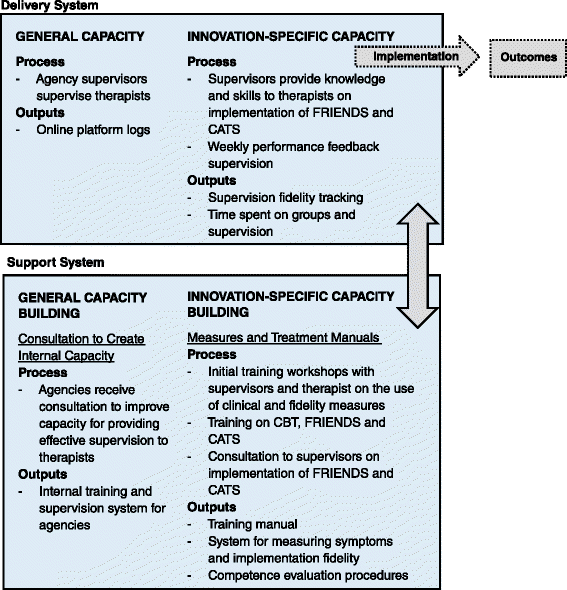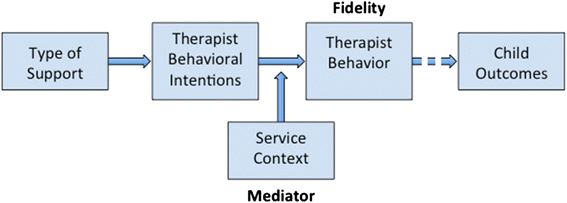A hybrid effectiveness-implementation cluster randomized trial of group CBT for anxiety in urban schools: rationale, design, and methods
- PMID: 27405587
- PMCID: PMC4941021
- DOI: 10.1186/s13012-016-0453-z
A hybrid effectiveness-implementation cluster randomized trial of group CBT for anxiety in urban schools: rationale, design, and methods
Abstract
Background: Schools present a context with great potential for the implementation of psychosocial evidence-based practices. Cognitive behavioral therapy (CBT) is an evidence-based practice that has been found to be very effective in treating anxiety in various community settings, including schools. Friends for Life (FRIENDS) is an efficacious group CBT protocol for anxiety. Unfortunately, evidence-based practices for anxiety are seldom employed in under-resourced urban schools, because many treatment protocols are not a good fit for the urban school context or the population, existing behavioral health staff do not receive adequate training or support to allow them to implement the treatment with fidelity, or school districts do not have the resources to contract with external consultants. In our prior work, we adapted FRIENDS to create a more culturally sensitive, focused, and feasible CBT protocol for anxiety disorders (CBT for Anxiety Treatment in Schools (CATS)).
Methods/design: The aim of this 5-year study is to evaluate both the effectiveness of CATS for urban public schools compared to the original FRIENDS as well as compare the implementation strategies (train-the-trainer vs. train-the-trainer + ongoing consultation) by conducting a three-arm, parallel group, type 2 hybrid effectiveness-implementation trial in 18 K-8 urban public schools. We will also assess the cost-effectiveness and the mediators and moderators of fidelity. Ninety therapists, 18 agency supervisors, and 360 children will participate. The interactive systems framework for dissemination and implementation guides the training and support procedures for therapists and supervisors.
Discussion: This study has the potential to demonstrate that agency therapists and supervisors who have had little to no prior exposure to evidence-based practices (EBPs) can implement an anxiety disorder EBP with fidelity. Comparisons of the implementation strategies would provide large urban mental health systems with data to make decisions about the adoption of EBPs.
Trial registration: ClinicalTrials.gov, NCT02651402.
Keywords: Anxiety disorders; Capacity building; Co-location model; Effectiveness; Group cognitive behavioral therapy; Hybrid trial; Implementation; Urban schools.
Figures
Similar articles
-
Therapist and supervisor perspectives about two train-the-trainer implementation strategies in schools: A qualitative study.Implement Res Pract. 2023 Aug 3;4:26334895231190854. doi: 10.1177/26334895231190854. eCollection 2023 Jan-Dec. Implement Res Pract. 2023. PMID: 37790186 Free PMC article.
-
Study protocol: cluster randomized trial of consultation strategies for the sustainment of mental health interventions in under-resourced urban schools: rationale, design, and methods.BMC Psychol. 2022 Feb 7;10(1):24. doi: 10.1186/s40359-022-00733-8. BMC Psychol. 2022. PMID: 35130964 Free PMC article.
-
Adaptive School-based Implementation of CBT (ASIC): clustered-SMART for building an optimized adaptive implementation intervention to improve uptake of mental health interventions in schools.Implement Sci. 2018 Sep 5;13(1):119. doi: 10.1186/s13012-018-0808-8. Implement Sci. 2018. PMID: 30185192 Free PMC article. Clinical Trial.
-
Psychological therapies for the treatment of post-traumatic stress disorder in children and adolescents (Review).Evid Based Child Health. 2013 May;8(3):1004-116. doi: 10.1002/ebch.1916. Evid Based Child Health. 2013. PMID: 23877914 Review.
-
Computers and psychosocial treatment for child anxiety: recent advances and ongoing efforts.Depress Anxiety. 2011 Jan;28(1):58-66. doi: 10.1002/da.20757. Depress Anxiety. 2011. PMID: 21049529 Review.
Cited by
-
Therapist and supervisor perspectives about two train-the-trainer implementation strategies in schools: A qualitative study.Implement Res Pract. 2023 Aug 3;4:26334895231190854. doi: 10.1177/26334895231190854. eCollection 2023 Jan-Dec. Implement Res Pract. 2023. PMID: 37790186 Free PMC article.
-
Predicting implementation: comparing validated measures of intention and assessing the role of motivation when designing behavioral interventions.Implement Sci Commun. 2020 Sep 28;1:81. doi: 10.1186/s43058-020-00050-4. eCollection 2020. Implement Sci Commun. 2020. PMID: 33005900 Free PMC article.
-
Assessing Implementation Strategy Reporting in the Mental Health Literature: A Narrative Review.Adm Policy Ment Health. 2020 Jan;47(1):19-35. doi: 10.1007/s10488-019-00965-8. Adm Policy Ment Health. 2020. PMID: 31482489 Free PMC article.
-
Development and evaluation of a remote training strategy for the implementation of mental health evidence-based practices in rural schools: pilot study protocol.Pilot Feasibility Stud. 2022 Jun 17;8(1):128. doi: 10.1186/s40814-022-01082-4. Pilot Feasibility Stud. 2022. PMID: 35710520 Free PMC article.
-
Using stakeholder perspectives to guide systematic adaptation of an autism mental health intervention for Latinx families: A qualitative study.J Community Psychol. 2020 May;48(4):1194-1214. doi: 10.1002/jcop.22296. Epub 2019 Dec 9. J Community Psychol. 2020. PMID: 31816103 Free PMC article.
References
-
- Greco L, Morris T. Factors influencing the link between social anxiety and peer acceptance: Contributions of social skills and close friendships during middle childhood. Behav Ther. 2005;36(2):197–205. doi: 10.1016/S0005-7894(05)80068-1. - DOI
Publication types
MeSH terms
Associated data
Grants and funding
LinkOut - more resources
Full Text Sources
Other Literature Sources
Medical
Research Materials
Miscellaneous



